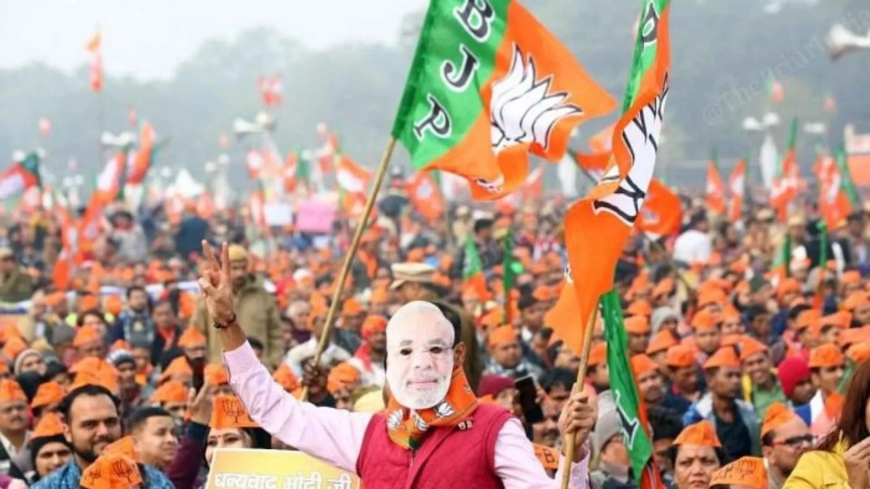istoric Comeback: BJP Regains Control of Delhi After 27 Years in Landmark Assembly Election Victory
The Bharatiya Janata Party (BJP) secures a resounding victory in the Delhi Assembly Elections, ending AAP’s decade-long dominance and returning to power after 27 years. Explore detailed results, key constituencies, and political implications.

New Delhi, June 3, 2025 — In a dramatic political shift, the Bharatiya Janata Party (BJP) has secured a decisive majority in the Delhi Assembly Elections 2025, marking the party’s return to power after 27 years in the national capital. The victory not only ends the Aam Aadmi Party (AAP)’s decade-long rule but also repositions Delhi as a politically significant stronghold for the BJP ahead of the 2029 General Elections.
The results were officially announced by the Election Commission of India on Tuesday, with the BJP bagging 45 out of 70 seats, a substantial gain from its previous tally of 8 seats in 2020.
You can view the complete constituency-wise results on the Election Commission’s official portal.
BJP’s Campaign Strategy: National Issues, Local Focus
The BJP’s campaign, spearheaded by Union Home Minister Amit Shah and Delhi BJP President Virendra Sachdeva, focused on a mix of nationalism, infrastructure, and law-and-order issues, with strong messaging around clean governance and development-driven leadership.
Key elements of the BJP’s strategy included:
-
Door-to-door outreach campaigns in urban colonies and unauthorized settlements
-
Aggressive focus on water, electricity, and sanitation promises
-
Targeting AAP over alleged corruption in the liquor policy scam, as detailed in reports by The Hindu
-
Leveraging Prime Minister Modi’s popularity through roadshows and digital campaigns
AAP’s Decline: What Went Wrong?
The ruling Aam Aadmi Party (AAP), led by Chief Minister Arvind Kejriwal, suffered a major electoral setback, managing to secure only 23 seats, a dramatic fall from its 2020 performance of 62 seats.
Several factors contributed to AAP’s decline:
-
Multiple corruption investigations, including the ongoing Excise Policy case
-
Internal party conflicts and lack of visible grassroots mobilisation
-
Voter fatigue with prolonged incumbency and perceived administrative stagnation
-
Discontent among government employees and teachers over delays in salaries and promotions
A detailed post-election analysis published by PRS Legislative Research points to the impact of governance fatigue and shifting urban concerns in middle-class voters.
Voter Turnout and Demographics
Delhi saw a voter turnout of 63.4%, slightly higher than 2020’s 62.5%. Young voters aged 18–25 emerged as a critical bloc, with many swayed by job creation, entrepreneurship opportunities, and a shift away from identity politics.
According to the Centre for the Study of Developing Societies (CSDS), the BJP made deep inroads among the Punjabi and Vaishya communities, while maintaining its traditional stronghold in trader and middle-class neighbourhoods like Laxmi Nagar, Karol Bagh, and Rajouri Garden.
Key Constituency Battles
-
New Delhi: BJP’s Ravi Shankar Kapoor defeated AAP’s Atishi by a narrow margin of 1,256 votes.
-
Chandni Chowk: Veteran BJP leader Harsh Vardhan made a comeback, defeating INC's Alka Lamba.
-
Okhla: In a major upset, the BJP’s minority candidate Javed Malik clinched victory in a constituency dominated by AAP for over a decade.
For detailed constituency-wise outcomes, visit NDTV's Delhi election results tracker.
Statements from Party Leaders
Prime Minister Narendra Modi tweeted shortly after the results were confirmed:
“Delhi has voted for development, transparency, and strong leadership. I thank every voter for their trust. This is not just a victory for the BJP, but for the aspirations of the people of Delhi.”
Amit Shah, during his address at the BJP headquarters, remarked:
“The people of Delhi have ended 27 years of political exile for the BJP. We dedicate this win to every karyakarta who worked tirelessly on the ground.”
Arvind Kejriwal, in a brief concession speech, said:
“We accept the mandate with humility. The AAP government has served the people of Delhi with dedication. We will introspect, rebuild, and continue to raise our voice on public issues.”
What’s Next for Delhi?
With a BJP-led government set to take charge, political observers anticipate a significant realignment in Delhi’s urban development agenda. Key expectations include:
-
Reform in municipal services post the 2022 MCD unification
-
Fast-tracked infrastructure projects, including the Delhi Metro Phase IV and peripheral expressways
-
Integration with central schemes like Ayushman Bharat and Jal Jeevan Mission
-
Increased cooperation between Delhi LG and state government, minimizing previous governance clashes
A preview of BJP’s full manifesto and policy roadmap is available on their official website.
National Impact and 2029 Outlook
This landslide victory for the BJP in Delhi will have ripple effects across the national political landscape. Analysts see this as:
-
A prelude to BJP’s renewed urban push in other non-BJP metros like Mumbai and Chennai
-
A major psychological blow to INDIA bloc unity, especially after the recent differences over leadership
-
A chance for BJP to fine-tune its governance model for urban India
As reported by The Indian Express, internal surveys suggest this victory has emboldened BJP’s cadre in adjacent states like Haryana and Punjab.
Final Thoughts
The BJP’s return to power in Delhi after nearly three decades marks not just an electoral win but a political transformation. From being a marginal player in Delhi’s Assembly to a dominant force once again, the BJP has demonstrated how strategic messaging, strong leadership, and ground-level connect can alter long-standing voter loyalties.
As Delhi prepares for a new government, citizens and critics alike will watch closely to see whether the promises of development, transparency, and inclusive governance materialize into tangible change—or become another chapter in the capital’s ever-shifting political story.

















































